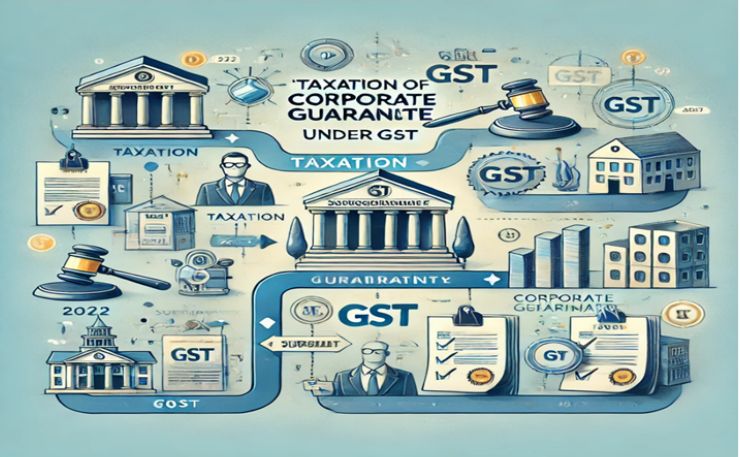Table of Contents
A corporate guarantee is a financial commitment made by a parent company or a financially strong entity within a corporate group to ensure that the obligations of a subsidiary or a related party are met. This guarantee provides assurance to lenders, typically banks or financial institutions, that the guarantor will fulfil the repayment obligations if the borrower defaults on the loan. As such, corporate guarantees play a crucial role in facilitating loans or credit under more favourable terms for the borrower. Over time, the taxation of corporate guarantees, especially under the Goods and Services Tax (GST) regime in India, has undergone significant changes. This essay delves into the understanding of corporate guarantees and traces the timeline of key developments that have shaped their taxation under GST.
Introduction to Corporate Guarantee
A corporate guarantee serves as a form of security for lenders, enabling borrowers to secure loans more easily and on better terms. For example, if Company A, the holding company, provides a corporate guarantee for its subsidiary, Company B, it essentially assures the lender that the loan given to Company B will be repaid by Company A if Company B fails to do so. The main objectives of such guarantees include making loans more accessible, transferring the guarantor’s credit rating to the borrower, securing beneficial loan terms, and reducing interest rates.
In practice, corporate guarantees between related parties, such as within a group of companies, are often provided without any direct monetary consideration. This practice has raised questions regarding the taxability of such guarantees under different tax regimes, including the now-defunct Service Tax and the current GST regime.
Timeline of Key Developments
The taxation of corporate guarantees has evolved significantly, particularly under GST. The timeline of key events that have shaped this evolution is as follows:
February 2022: Supreme Court Ruling on Edelweiss Financial Services Ltd.
In February 2022, the Hon’ble Supreme Court delivered a landmark judgment in the case of Edelweiss Financial Services Ltd., which dealt with the taxability of corporate guarantees under the Service Tax regime. The court dismissed the appeal by the Revenue, which argued that corporate guarantees provided by a taxpayer to group companies without consideration should be considered a taxable service. The Supreme Court held that, under the Service Tax regime, the issuance of a corporate guarantee without consideration did not constitute a taxable service. This judgment set a significant precedent, influencing the approach to corporate guarantees under GST.
2023: Introduction of Rule 28(2) under GST
The GST regime, which came into effect in 2017, brought with it new challenges and opportunities for the taxation of services, including corporate guarantees. In 2023, a major development occurred with the introduction of Rule 28(2) under the CGST Rules. This rule, effective from 26th October 2023, was introduced via Notification №52/2023 — Central Tax, followed by Circular №204/16/2023-GST. Rule 28(2) provided a specific mechanism for determining the value of corporate guarantees provided between related parties. According to this rule, the value of a corporate guarantee was deemed to be 1% of the amount guaranteed or the actual consideration received, whichever was higher. This marked a significant shift in the approach to taxing corporate guarantees under GST.
2024: Amendments and Clarifications
The year 2024 saw further refinements to the taxation of corporate guarantees under GST. On 10th July 2024, Notification №12/2024 — Central Tax introduced amendments to Rule 28(2), effective retroactively from 26th October 2023. The amendments clarified that the 1% valuation was to be applied on a per annum basis, and that the rule did not apply to the export of such services. Additionally, the amendments provided that where the recipient of the guarantee is eligible for full input tax credit (ITC), the value declared in the invoice would be deemed to be the value of the service.
These amendments were accompanied by Circular №225/19/2024-GST, dated 11th July 2024, which addressed several issues regarding the application of Rule 28(2). The circular provided clarifications on various scenarios, such as the taxability of intra-group guarantees, the eligibility for ITC, and the applicability of GST in cases where a corporate guarantee is issued or renewed. The circular also clarified that Rule 28(2) would not apply to the export of corporate guarantee services and provided guidelines on how GST should be applied when multiple guarantors are involved.
Understanding the Corporate Guarantee under GST
The introduction of Rule 28(2) and its subsequent amendments have provided a clear framework for the taxation of corporate guarantees under GST. By deeming the value of such guarantees at 1% of the amount guaranteed or the actual consideration, whichever is higher, the GST regime has sought to bring corporate guarantees within the tax net, even when no direct monetary consideration is involved.
However, this approach has not been without controversy. Several legal challenges have arisen, questioning the fairness and applicability of these rules. For instance, in the case of Sterlite Power Transmission Ltd., the petitioner argued that corporate guarantees should not be considered a taxable service under GST, as they are contingent contracts that do not necessarily involve the provision of a service unless invoked. Similarly, in the case of Acme Cleantech Solutions (P.) Ltd., the petitioner challenged the circular issued by the GST authorities, arguing that it pre-empted the powers of the Assessing Authority.
These ongoing litigations highlight the complexities and challenges involved in taxing corporate guarantees under GST. Despite these challenges, the government’s intent is clear: corporate guarantees are to be taxed under GST, ensuring that such transactions are not left outside the tax net.
Conclusion
The taxation of corporate guarantees has evolved significantly under the GST regime, shaped by key developments over the past few years. From the Supreme Court’s ruling in 2022 to the introduction and amendment of Rule 28(2) in 2023 and 2024, the approach to taxing corporate guarantees has become more structured and defined. While challenges and litigations continue to arise, the framework provided by the GST regime ensures that corporate guarantees are brought within the tax fold, reflecting the government’s intent to create a comprehensive and inclusive tax system. As the legal landscape continues to evolve, it will be important to monitor further developments in this area, particularly as courts and policymakers address the challenges posed by the taxation of corporate guarantees.




